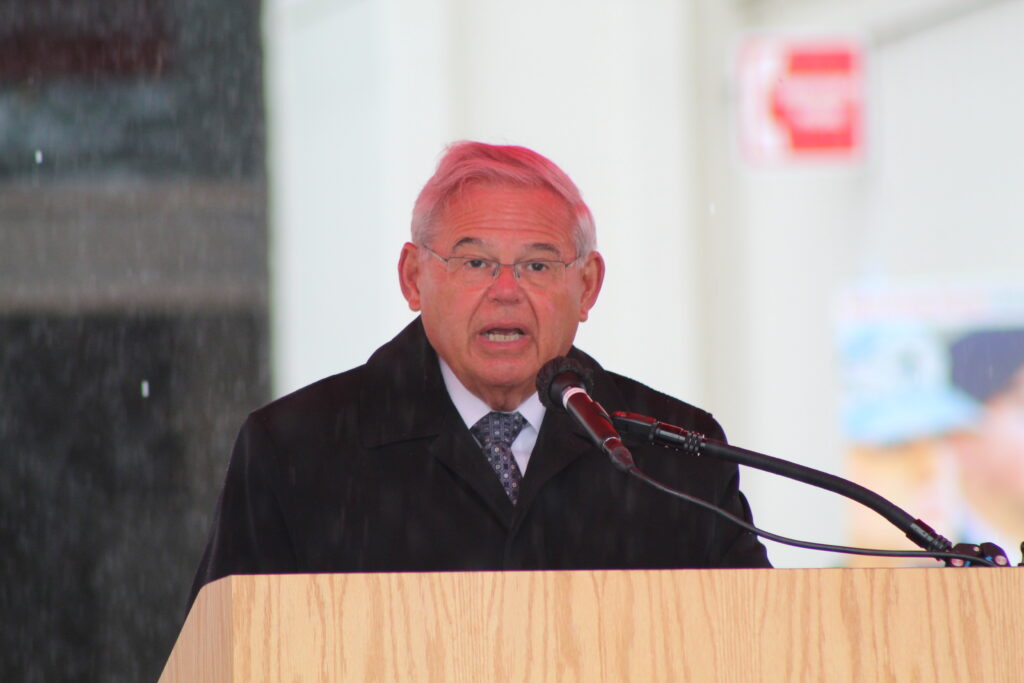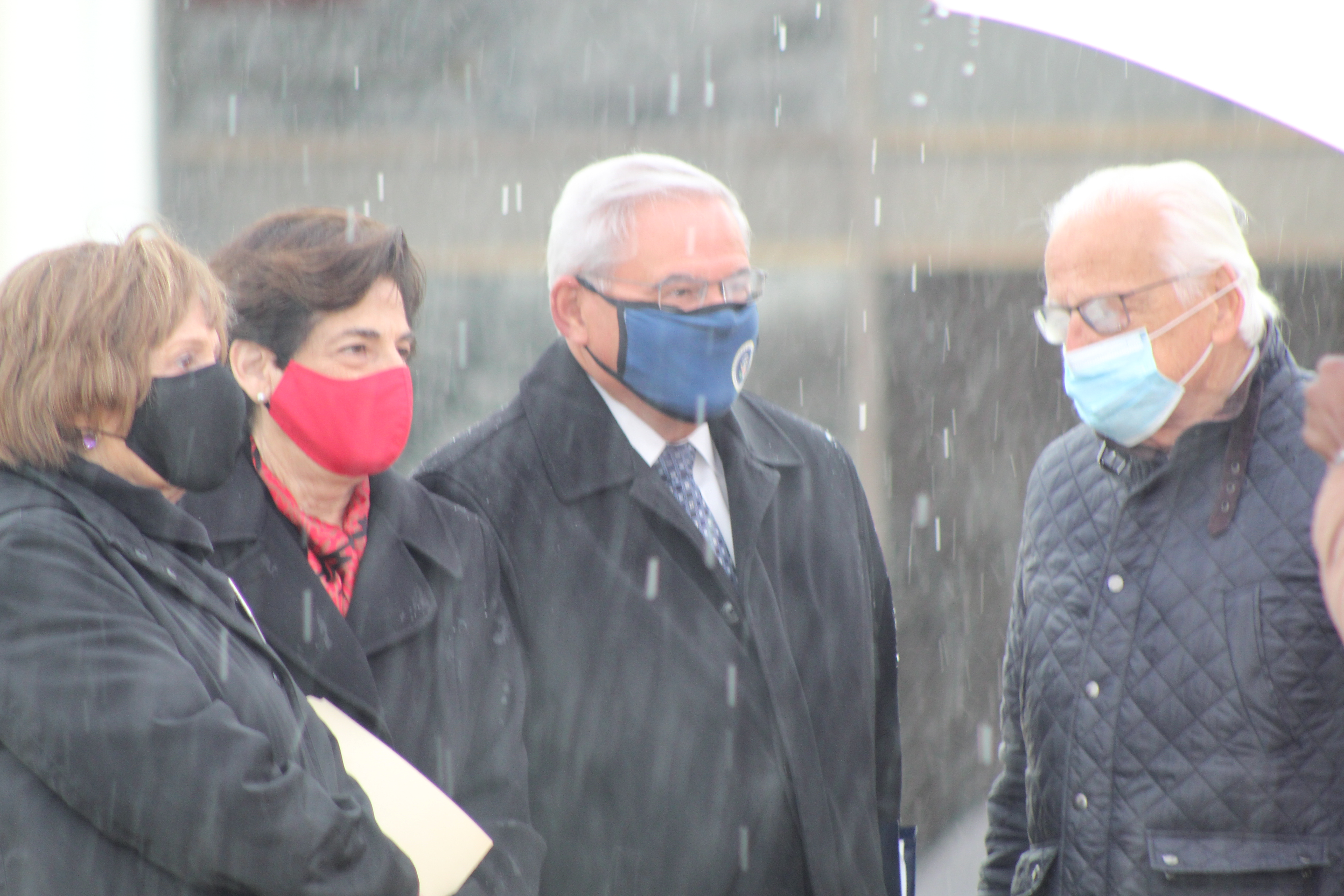Menendez and Pascrell Urge Biden to Move on Student Loan Forgiveness

MONTCLAIR - Outside the Montclair University Student Center, in a markedly low-key affair given the enormous implications of its message, gathered men and women who may potentially be able to radically and profoundly impact the financial lives of the students and alumni of that very institution. Introduced by Dr. Susan Cole, the President of Montclair State University, US Senator Bob Menendez and Congressman Bill Pascrell stepped to a podium to speak--though without an in-person student audience--directly to the cameras and urge President Biden to move on student loan forgiveness up to $50,000. Additionally, the officials described how the recently passed American Recovery Act makes provisions to make student debt forgiveness tax-free through the next five years.
“I was proud to author the Student Loan Tax Relief Act and fought hard alongside Senator Elizabeth Warren to include it in the American Rescue Plan,” Menendez said under a tent as rain steadily beat down on the canvas above. “We had a great champion in Bill Pascrell in the House. Because of its passage and now signed into law, Borrowers who now qualify for debt forgiveness are now protected from huge surprise tax bills. Until now, most forgiven student debt was considered income. Just imagine qualifying to have thirty thousand dollars in student debt forgiven, and then having the IRS come after you for nearly $7,000 in owed taxes. It makes no sense, and it makes even less sense in the middle of a pandemic when so many are hurting. Thanks to the American Rescue Plan, forgiven student debt will now be tax-free until 2026, saving the average borrower about $2,200 in taxes for every $10,000 in forgiven student loans. Even better, by passing this bill, Democrats have set the stage for President Biden to take bold action to free millions of Americans from crushing student loan debt and jumpstart our economic recover. Today we are calling on President Biden to use his authority to forgive up to $50,000 in student loan debt.”
The Senator said that in the state of New Jersey, there were some 1.3 million student borrowers who held $48.8 billion in student loan debt, on average $33,000 per person. Across the country, student loan debt is estimated to be $1.6 trillion, some $400 billion less than the American Recovery Act itself, and that loan-holders were struggling even before the pandemic to make their payments. Now, with the economy recovering but still in a crisis, those families remain tied to those payments. Menendez said that student loan forgiveness had the ability to free millions of Americans and to revive the economy.
Menendez said that the New Jersey average monthly student loan bill was $310 monthly, with many borrowers paying even more. “Just imagine what people could do if some or all of that debt was forgiven.” The senator said freeing borrowers of some of that burden could allow them to consider major life purchases and decisions, such as buying new cars, homes, or starting families. “Here’s the bottom line, student loan forgiveness has the power to unleash a wave of consumer-driven growth in this country.”
The senator said that the president does not need congressional authority to act on loan forgiveness and can do so immediately. “For far too long, incomes have failed to keep pace with the rising cost not only of education but also health care, housing, child care, and other basic living expenses. When you are barely keeping your head above water it is a hell of lot harder to make a dent in your student loan principle.”

Congressman Pascrell thanked the university for inviting him and noted that while did not represent the area in Congress, he held a strong fondness for the institution and valued its students. He said that the pandemic had robbed the students of a year of their lives, and their time at the school. “Students face enormous anxiety about the post-pandemic world and carry mountains of loan debt. It shouldn’t be this way. Thanks to the Pascrell-Menendez-Gomez-Warren provision included in the American Rescue Plan, student debt loan forgiveness can be tax-free and give enormous flexibility to millions of Americans. Absolutely no one who wants to pursue an education and better themselves should be saddled with debts for the rest of their lives.”
The Executive Director of NJ Citizen Action, Phyllis Salowe-Kaye, said that one out of six New Jersey adults owes, collectively, some $50 billion in student loans, both federal and privately held. “This was not sustainable before COVID, let alone in the aftermath of the current economic crisis. Citizen Action thanks Senator Menendez and Congressman Pascrell for ensuring that all student debt relief will be tax free.” She joined with Menendez and Pascrell to ask President Biden to move on eliminating up to $50,000 in student debt. “The costs and financing of post-secondary education in this country are unjust and disproportionately challenging for Black and Brown students and their families. Without systemic change to education financing, access to affordable higher education and career training will continue plummeting and leave millions with insurmountable debt. If we want a competitive work force, a solid inclusive middle class and a strong economy, we need student debt cancellation and reform now.”
University senior Jasmine Metellus and Rutgers graduate Robert Cabanas spoke next. “Having loans puts students on a financial hold because once we graduate, we are accumulating interest on top of our debt and to fan the flames, it’s difficult to find jobs since the debt is so much higher than our salaries,” Metellus said, noting that paying back the large loans was inhibiting students from being able to accumulate wealth, build credit, and buy homes. “The power of loan forgiveness would help narrow the racial wealth gap and put students in a better place when it comes to education and their finance.”
Cabanas carries $60,000 in student loan debt. “Folks in my generation graduated college during the Iraq War, we lived through the Recession, and when things finally started to get together and the economy started to take off, here we are dealing with COIVD, back in another disaster… All we’re doing is trying to get ahead and there’s been so many barriers for my generation to start families and to live the American dream.”





